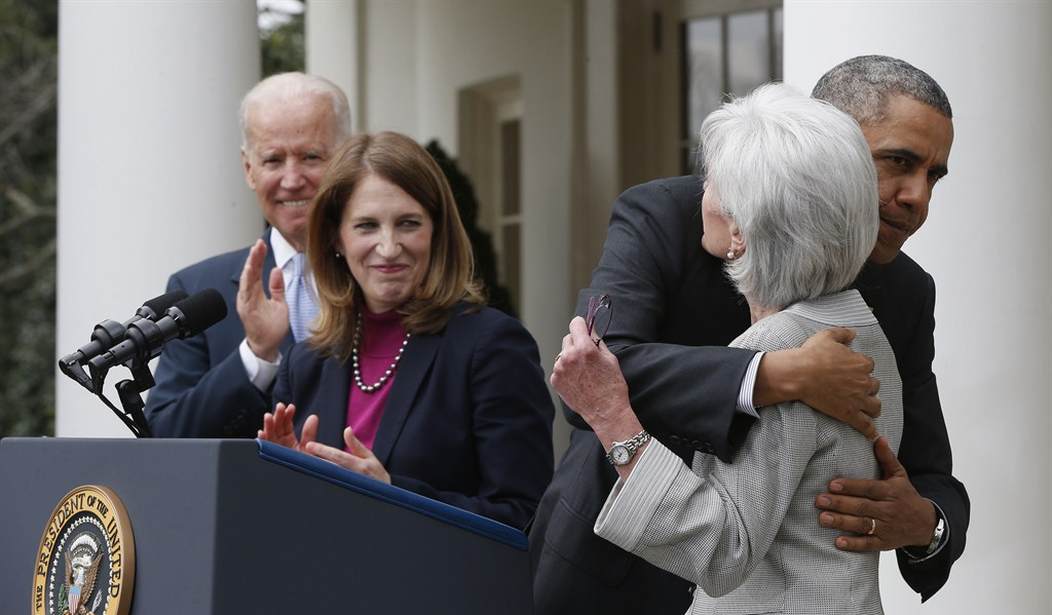Please consider Friday's 'Obamacare losing streak' post officially updated. Behold, the 'Affordable' Care Act at work. Congratulations, "beneficiaries" (via The Hill):
Advertisement
The average price of the most popular ObamaCare health insurance plans rose 10 percent for 2015, according to a new study of premium figures published Friday by the Department of Health and Human Services (HHS)...Not only are premiums increasing, but if consumers do not pick a different plan, they could pay more due to annual changes in how subsidies are calculated.
That's according to the administration itself -- and we know how scrupulously transparent they are about reporting unhelpful news, don't we? This double-digit average increase for consumers who've signed up for Obamacare's most popular plans speaks to another problem we addressed over the summer: Namely, as the exchanges' so-called "benchmark" plans change from year to year, a large number of customers will be forced to decide between absorbing higher costs (as previous benchmark plans hike their rates), and uprooting themselves from their existing plan -- again, in many cases. And, as usual, this doesn't even address the high out-of-pocket costs associated with Obamacare's "affordable" plans. Plus, it's tough to anticipate the full extent of the chaos that will befall the (already buggy) subsidy calculation regime if the Supreme Court reaches the correct conclusion in
Recommended
Advertisement
[Forty-one] percent of uninsured Americans intend to remain uninsured - the vast majority because they do not believe they will find an affordable plan; Just 37 percent have a favorable view of the law, against 46 percent who do not; 46 percent say the law should be repealed or scaled back, against 42 percent who want it expanded or implemented as is; and, Just 16 percent say the law has helped them, while 24 percent say it has hurt (with the majority of those saying it has increased their health costs).
They'll pay substantially more next year for the privilege of remaining uninsured -- unless they avail themselves of one of the administration's catch-all hardship waivers -- but those punitive taxes will still be much lower than than the cost of enrolling in and paying for Obamacare "coverage." I employ scare quotes there because many Obamacare consumers continue to be let down by their plans' narrow coverage networks, resulting in frustrating problems keeping preferred doctors and obtaining care. In California, the pain of "access shock" has been amplified by a spate of
Advertisement
Bolstering a chief complaint about Obamacare coverage, California regulators said two major health insurers violated state law by overstating the number of doctors available to patients. More than 25% of physicians listed by Anthem Blue Cross and Blue Shield of California weren't taking Covered California patients or were no longer at the location listed by the companies, according to state reports released Tuesday. In some cases, these errors led to big unforeseen medical bills when patients unwittingly ventured to out-of-network doctors for medical tests or a surgery. The results of the five-month investigation come at a critical juncture as the second year of health law enrollment gets underway...
State regulators are blaming the insurance companies for this kerfuffle, but recall that Covered California, the state's marketplace, experienced similarly embarrassing missteps on this front, too. These troubles only feed into the larger Obamacare narrative of confusion and incompetence. Speaking of state-level exchanges, oh look -- fresh cost pressures:
The federal government shelled out billions of dollars to get health insurance marketplaces going in the 14 states that opted to run their own. Now they must act like true marketplaces and start paying for themselves. Under President Barack Obama's Affordable Care Act, state-run health insurance exchanges need to be financially self-sustaining starting in January. Some appear to be on that path, while others have shaky funding models or even none at all. Some states, prohibited from using state money, are imposing fees on plans sold on the marketplaces. Others are spreading costs more widely — which, in one instance, has drawn a federal lawsuit.
Advertisement
Click through to read about various states that have no way to pay for ongoing exchange operations, prompting calls to join the federal exchange (which may not allow for any taxpayer subsidies, pending the aforementioned SCOTUS ruling), and the imposition of taxes and fees that are driving up the cost of healthcare. The legislatures and governors who declined to participate in this mess are looking more fiscally prudent by the day.

























Join the conversation as a VIP Member